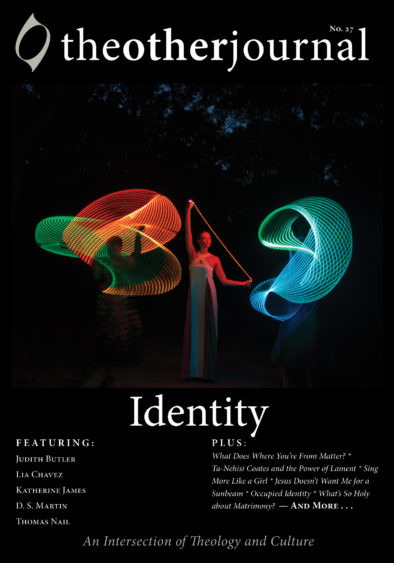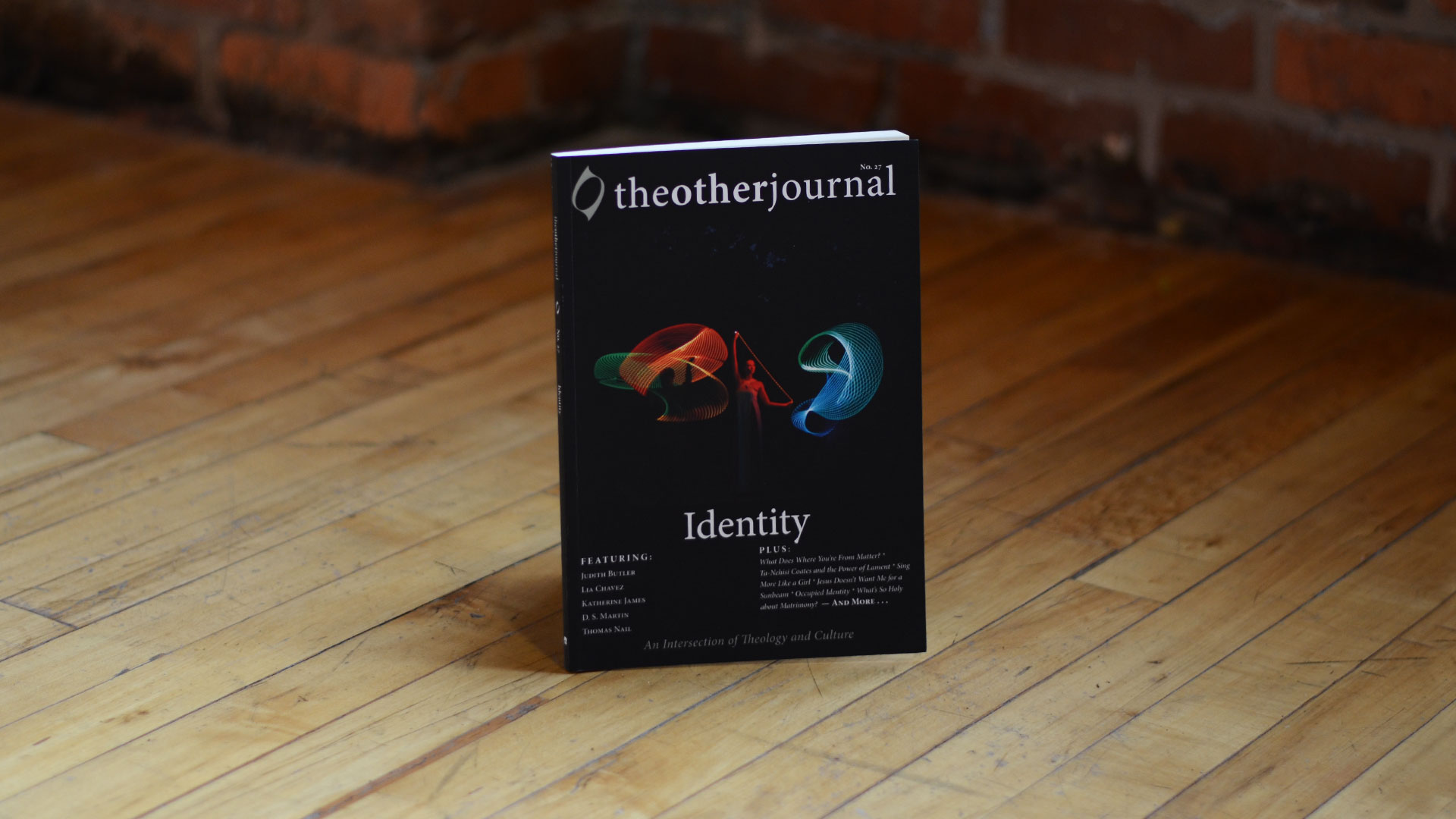 Letter from the Editors
Letter from the Editors
In 2003, a group of theologically minded graduate students collaborated to form the first online issue of The Other Journal. At the time, we observed an uncomfortable alliance between an overtly evangelical president and a religiously driven endorsement of American exceptionalism. We saw that in the wake of 9/11, we were on the verge of two simultaneous (and ultimately protracted) wars in the Middle East. And we believed that if we were to truly understand the moment and challenge the dominant discourse, it was essential to promote theological literacy and Christian ethical discernment.
This is a belief that has continued to guide us over the past fifteen years. Our mission then (and now) was to encourage churches, divinity schools, and Christian leaders to wrestle with real issues in our culture, our theologies, and our community practices. Our hope (then and now) was that this dialogue would help our readers to be sharp interpreters of the culture and that it would shape us toward being thinkers and practitioners who embody and pursue love, justice, and peace.
In 2017, we face a very different cultural/political moment than when the journal first began. And yet, with the election and ascendency of Donald Trump to the presidency, the abrupt shift toward an “America first” mentality, and the emboldening of racism, sexism, environmental assault, and corporate exploitation, our work at TOJ now seems more pressing than ever.
As a staff we’ve felt a pressing need to say something, to clearly and unequivocally register our dismay and offer guidance for what to do next. This has been especially true as we sought contributors for our current issue on the theme of identity — we knew that it was vital that we communicate who it is that we are and what we mean to be about. But we have also grappled with how best to offer such a response in this particular chaotic moment. We have felt the same shock, confusion, and uncertainty that so many others have expressed; and as a journal, we are gravely concerned about the trajectory of a presidential and congressional agenda that appears aggressive and destructive with respect to health care, environmental protections, affirmative action policies, and international relations.
Perhaps most disturbing to many of us here at TOJ, however, has been the failure of the church to generate and coalesce around sustained movements of social and political alternatives in the face of this threat. We have struggled to understand how many evangelicals and Catholics could square their own devotion to life with an individual so out of step with the message of the gospel. We have also been perplexed by Christians on the left who have not pushed harder to come together to create communities determined by the collective good, as the theorist Judith Butler encourages us in this issue, rather than the deep sense of individualism that is not characteristic of a society of choice.
Perhaps now more than ever, we desperately need a movement rooted in collective hope and a defiance to empire. To that end, we have a deep theological heritage to draw from, one that has a long and rich tradition of embracing its prophetic voice in the face of oppressive and hegemonic regimes. When German theological institutions signed off on the war efforts in WWI, Karl Barth uttered a defiant theology of refusal, insisting that God stood over and against state politics. Mary Daly revealed and critiqued ways that patriarchy infused itself in theological discourse, opening up ways of theologizing otherwise. And James Cone, who grew up in the Jim Crow South and experienced the white theological institutions of the United States, asserted the blackness of Jesus as one way to disrupt white supremacy’s theological foundations. Christian theology, when at its best, is a discourse of resistance, and this is the history we aim to draw on in our present moment.
We believe it is time for the church to begin leading a movement that addresses so many of the underlying issues that brought us here in the first place — an abiding faith in neoliberalism that has ushered in a new Gilded Age; a political theory of democracy that sees voting as the primary mode of political engagement; the inability to grapple with or acknowledge institutional racism; and the worship of a debt-driven capitalism that views our bodies as a resource to exploit for profit.
We do not know what the next four years will bring for the world politically, economically, or religiously. Too much is shifting; too much is uncertain. But we do know that Trump has emerged as a symptom of deeper cultural concerns. And as we have tried to do for the last fifteen years, we hope to continue offering you work that is prophetic, resistant, and forceful, work that points the way toward love, justice, and peace.
— Tom Ryan, Jessica Coblentz, Julie M. Hamilton, Brett Potter, Dan Rhodes, Zachary Thomas Settle, Matthew Shedden, and Andrew Shutes-David
About Issue 27: Identity
“We the people . . .” So begins the familiar first line to the Preamble of the United States Constitution. But even in its initial context, in a document intended to be a manifesto of hope and freedom, the matter of who exactly was to be included in this “we” was unclear and contested. First-person pronouns (i.e., I and we) roll off the tongue-or onto parchment paper-with ease, but their common use often belies an underlying complexity. Who am I? Who are we? Who does my theology say that I am?
Identity is at the same time essential to life and yet also deeply contested, problematic, and enigmatic. The world may be becoming more one and, yet, it seems also to be becoming more different, fragmented, agonistic, and isolated.
In this issue of The Other Journal, we explore the valences of identity, both individual and communal, personal and public. We take up the theme of identity in multiple ways, examining its interconnections with gender and race, the dissolution and reconstitution of borders, and, yes, even the 2016 presidential campaign.
The issue features essays by Derek Brown (“Occupied Identity”), Zach Czaia, Ryan Dueck, Julie M. Hamilton, Peter Herman (“Jesus Doesn’t Want Me for a Sunbeam”), Zen Hess (“What Does Where You’re From Matter”), Kimberly Humphrey, Katherine James, Russell Johnson, Sus Long (“Sing Like a Girl”), Willow Mindich, Dr. Angela Parker (“Can’t Stop the Feelings: Anger and Identity in March 6:17-29”), Taylor Ross (“Ta-Nehisi Coates and the Power of Lament”), and Erick Sierra; interviews by Stephanie Berbec (MA in Theology & Culture ‘13) and Zachary Thomas Settle with Judith Butler and Thomas Nail, respectively; poetry by T. M. Lawson, D. S. Martin, Oluwatomisin Oredein, and Erin Steinke; performance art by Lia Chavez; and photography by Jennifer Jane Simonton, Pilar Timpane, and Mark Wyatt.
Learn more about the Identity issue and read selections from contributors on The Other Journal, or purchase the print edition on Amazon.

Housed within The Seattle School of Theology & Psychology, The Other Journal is a twice-yearly print and digital journal that aims to create space for Christian interdisciplinary reflection, exploration, and expression at the intersection of theology and culture. Attempting to remain a step or two more popular than the typical scholarly journal and a step or two more scholarly than the typical popular magazine, TOJ collaborates with contributors around the globe to provide readers with provocative, challenging and insightful Christian commentary on current social issues, political events, cultural trends, and pop phenomena.

